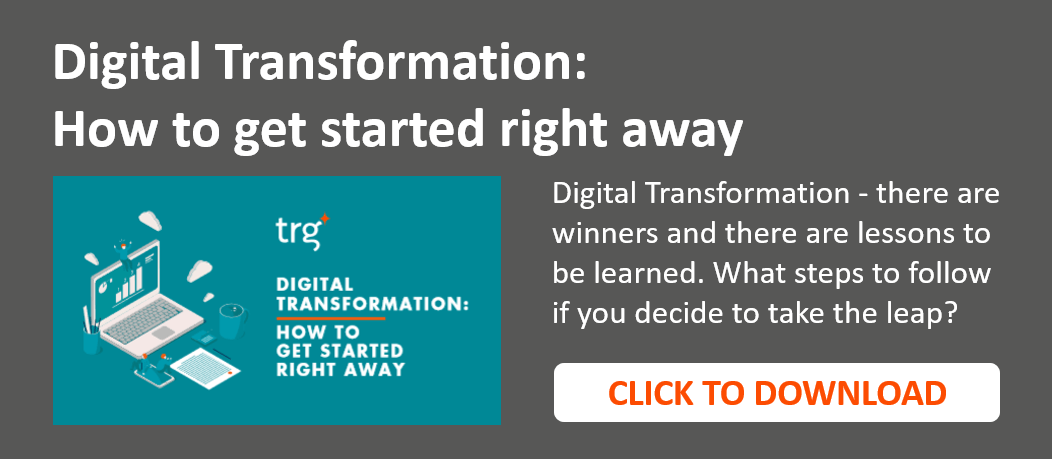With rapidly changing market demands, the energy sector is tackling unprecedented challenges. There is a need to adapt to significant developments in technology, effectively manage an ageing infrastructure, ensure risk and compliance, handle increased customer expectations, and maintain a skilled workforce for the long term. This new landscape requires energy companies to embrace new operating and business models to maintain their competitive edge in the market.
Read more: Digital Transformation In a Business-As-UnUsual COVID-19 World

1. Modernising technology
There is no denying that technology is changing at what feels like the speed of light. And it is also true that outdated technology solutions can negatively impact organisations in several ways. They are costly to maintain, they impede employee productivity, they provide many opportunities for error, and can ultimately impact both the employee and customer experience – all of which will reduce a company’s return on investment (ROI).
To stay competitive, organisations need cloud-based, mobile-friendly platforms that are agile, scalable, and modern to support business today and into the future.
Traditional ERP solutions provide support for financials, human capital management, payroll, etc., but energy organisations have unique business needs that need to be addressed. Effective asset management, deep analytics, risk and compliance monitoring, supply chain management, and customer relationship management tools are all essential solutions to meet the needs of the front, middle, and back offices of energy companies.
Energy companies are consistently exploring ways to streamline operations, improve safety, and enhance productivity in increasingly complicated and regulated climates—and the best way to do this is to invest in modern technology.
Technology should not be adopted just for the sake of technology, but with an objective in mind. Will it lead to better customer service? Can it reduce costs in managing inventory? Will it enable decision support? In order to gain the benefits of new technology, it is important to evaluate the benefits and the timing of when those benefits will be realised. In other words, develop a well-defined business and investment plan.
Read more: Why Most Digital Transformation Projects Fail
2. Becoming data-driven
Effectively leveraging big data provides the energy sector with the insight to achieve several business objectives including improved customer service levels, streamlined operations, cost savings, and overall business efficiency. To set the stage for success, energy sector companies must assess their key business drivers and then identify what intelligence is required to meet the needs of the business today and into the future.
For example, according to the Canadian Electricity Association, “Predictive maintenance alone is expected to save utilities substantial funds. Whether it’s to better manage a fleet of generators, reduce outages or improve customer satisfaction, cost savings can be found across many departments.”
But how do you become a data-driven organisation?
Successful data-driven energy organisations generally rely on three guiding principles:
1. A culture in which all employees embrace the concept of leveraging data to make all decisions
2. An infrastructure that encourages a data-driven environment
3. Modern technology
Read more: Networked Analytics - the Next Wave of Business Intelligence
Data-driven culture
One of the most challenging elements for energy sector companies to migrate to a data-driven business model is the cultural shift required to embrace this new approach. From executives to work crews, everyone needs to be on board with this new approach to enable business-critical decision making.
A key enabler to adoption is to facilitate a central source of data. This not only positively impacts the user experience of the employees but also eliminates data silos which ultimately increases overall productivity.
Developing and maintaining a data-driven culture is not always straightforward, but once implemented, the advantages of doing so are considerable. Without a doubt, big data is changing the ways energy sectors operate by improving response times to power needs, loads and catastrophes. In addition, through the Internet of Things (IoT), energy companies realise improved uptime by monitoring the maintenance of every piece of the operation, from turbines to bolts and everything in between.
Read more: Building a Healthy Data Culture: 7 Factors to Consider
Data-driven infrastructure
Creating an organisational infrastructure to support a data-driven business demands a robust strategy and significant collaboration across key company stakeholders. It is crucial to develop a network to support this collaboration to eliminate barriers and drive innovation. With clearly defined roles and documented objectives, a climate of teamwork will be established.
The landscape for energy companies is becoming more and more complex, and more data is available than ever before. It is therefore crucial that the right data for the right person is both easily accessible and accurate. Ensuring governance, the policies that dictate how a business protects and manages its data is a vital component of a robust organisational infrastructure.
Read more: Can't Make Sense of Your Business Data? Here Are 5 Ways A.I. Can Help
Data-driven technology
Leveraging the power of analytics to assess the significant amount of data that energy sector companies accumulate provides insight into such things as enhancing regulatory governance, avoiding fraud, decreasing loss, enriching the customer experience, identifying customer usage patterns, improving the forecasting of demand, and more.
Having the capability to determine and analyse data in real-time can highlight intelligence previously unobtainable such as patterns of customer electricity consumption behaviour, for example. With access to this level of data, energy companies are better equipped to serve their customers and make educated decisions on future strategies.
It is a fine art to balance the complicated information demands of the energy industry; however, successful organisations in this space are embracing innovative ways to leverage technology and new business models to meet the complex challenges of energy sector analysis and reporting for today and into the future.
3. Transforming the workforce
Modern energy companies are increasingly dependent on technology to digitally transform operations and meet the needs of their growing customer bases. But many traditional jobs are transforming as well, leading to challenges around retention. This shift requires more thoughtful ways of recruiting, developing, and nurturing talent. Successful energy companies are implementing strategies to win the loyalty and dedication of employees, and foster a culture of continuous innovation.
A modern, connected workforce is more productive and flexible. Energy companies that have adopted a mobile or virtual capability for their employees have maintained business continuity, and are still operating at relatively high efficiency. Innovation requires more than the adoption of new technology, however. It requires having a talented and well-trained workforce.
Millennials entering this industry have high expectations of what they are looking for in an ideal employer. To improve employee retention, the energy sector must engage a well-developed talent management program with advanced evaluation and development capabilities.
Current technology makes it possible to create a personalised, individualised work experience that allows energy companies to recognise the unique talents of each employee and deploy those talents to maximum benefit.
To do this, HR departments should prioritise personalization rather than sameness—like offering individualised career paths, incentives, and adjustable work schedules. Beyond providing better business results, this concept helps companies attract and retain the types of employees that can deliver a consistently excellent customer experience.
There’s no denying that energy sector companies are facing significant change and growth in most facets of their business. To adjust and pave a path to success, they need to embrace change and incorporate the necessary business modifications to address the challenges of today and tomorrow.

 English
English  Vietnamese
Vietnamese 

